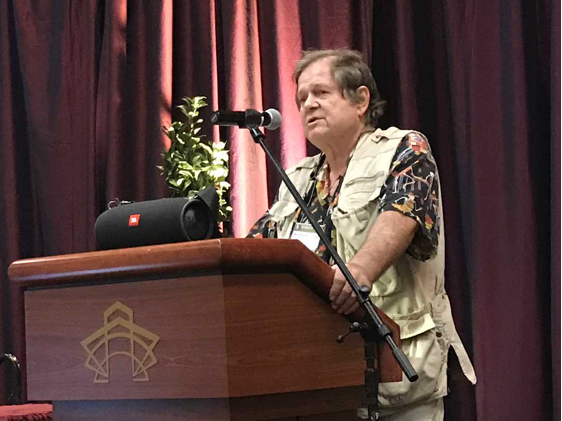Leading turtle researcher loses award after including inappropriate photos of women in a presentation
Presentation showing bare torsos saw some members of the Herpetologists’ League walk out in disgust

A leading turtle expert has had a prestigious honour revoked for including revealing photos of scantily-clad women in his presentation on river turtles.
Richard Vogt was being recognised as a distinguished herpetologist — a scientist who studies amphibians and reptiles — at an annual meeting of herpetologists and fish scientists in Rochester, New York.
It was his work that uncovered turtle communication methods, as well as demonstrating the link between turtle sex and egg incubation temperature.
But controversy arose over his accompanying plenary lecture, which contained photos of men and women doing research in water environments - including a handful of women whose torsos were censored with blue boxes, according to several people in attendance.
The images were censored by staff at the conference - not Mr Vogt, who said he was “shocked” and “flustered” during his presentation. One of the women pictured was his wife.
The lecture from Mr Vogt, who other herpetologists say has a history of using provocative photos in scientific presentations, prompted some in attendance to walk out,
The Herpetologists’ League, a membership society for scientists in the field, rescinded Mr Vogt’s award on Friday and has formed a committee to address diversity and inclusion.
“Many members of all genders took strong offence to the images that were presented and to the awarding of this distinction to someone whose extremely inappropriate behaviour towards other attendees has been long known,” the league said in a statement on Sunday.
“We acknowledge that scientific achievement does not excuse misconduct in the profession at any level,” the statement added.
The controversy shows how the #MeToo movement, which has empowered women to publicly address sexual harassment, is reaching the male-dominated field of science.
Herpetology has historically had a “macho, bro culture,” said Dan Edwards, who studies the evolution of reptiles and amphibians and was not at the conference.
When she was a young scientist nearly 20 years ago, Ms Edwards said, people joked that “to be a herpetologist you had to be bearded and wear socks and sandals.”
“And it’s like, well, I’m not bearded,” she said.
Turtles now world's most threatened vertebrates
Show all 3Ms Edwards said she had routinely witnessed obscene photographs and sexual innuendos in herpetology talks, though she said it had become less common in recent years.
“We’re scientists. We are there to learn about the animals,” said Emily Taylor, a herpetologist who saw the presentation. “We are not there to be subjected to pictures of half-naked women holding the animals.”
Mr Vogt, who is based in Brazil, defended his presentation, saying that there was “nothing sexual or indecent about the photos.”
“I am very sad that this has happened,” he added. “I have been a part of this community for 54 years.”
Mr Vogt said herpetology is not as male-dominated in Brazil, where he works mostly with women. He apologised that people were offended by the photos, which he said were not meant to “hurt, offend or demean anyone.”
“In the future I will be more careful,” he said.
New York Times
Subscribe to Independent Premium to bookmark this article
Want to bookmark your favourite articles and stories to read or reference later? Start your Independent Premium subscription today.

Join our commenting forum
Join thought-provoking conversations, follow other Independent readers and see their replies